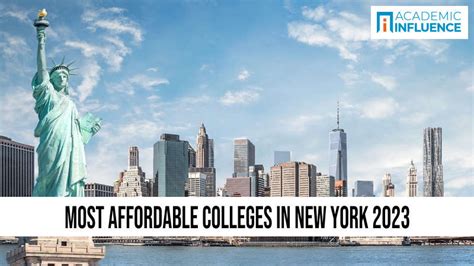Introduction
New York is renowned for its prestigious universities, but it can be daunting for aspiring students to find affordable options. This comprehensive guide provides a detailed overview of the most cost-effective universities in New York, empowering students to navigate the admissions process and secure a quality education without breaking the bank.

Most Affordable New York Universities
According to the College Board, the average annual tuition and fees for private four-year colleges in New York is $55,800. Fortunately, there are several affordable options available, including:
| Rank | University | In-State Tuition | Out-of-State Tuition |
|---|---|---|---|
| 1 | New York City College of Technology | $6,750 | $15,960 |
| 2 | City University of New York-College of Staten Island | $6,870 | $15,960 |
| 3 | City University of New York-Queens College | $6,870 | $15,960 |
| 4 | State University of New York-Upstate Medical University | $8,515 | $24,030 |
| 5 | State University of New York-Plattsburgh | $8,593 | $24,030 |
| 6 | City University of New York-City College | $7,230 | $16,650 |
| 7 | State University of New York-Oneonta | $8,763 | $24,382 |
| 8 | City University of New York-Brooklyn College | $7,410 | $16,650 |
| 9 | State University of New York-Fashion Institute of Technology | $8,782 | $24,382 |
| 10 | State University of New York-Stony Brook University | $10,200 | $26,780 |
Financial Aid and Scholarships
Financial aid plays a crucial role in making college more affordable. New York has a generous financial aid system, with over $7 billion in grants and scholarships awarded annually. The following resources can help students find and apply for financial aid:
- Financial Aid Office of the State University of New York (SUNY)
- Higher Education Services Corporation (HESC)
- Federal Student Aid
Cost-Saving Strategies
In addition to financial aid, there are several effective strategies students can employ to reduce the cost of college:
- Apply for in-state tuition: Students who have established residency in New York for at least 12 months prior to enrollment may qualify for in-state tuition rates.
- Take advantage of scholarships: There are numerous scholarships available to students based on academic merit, financial need, and other criteria.
- Attend a community college: Community colleges offer a more affordable option than four-year universities, and students can later transfer their credits to a university.
- Consider online learning: Online programs can be more cost-effective than traditional on-campus programs.
- Live off-campus: On-campus housing can be expensive. Students can save money by living in off-campus apartments or with family members.
FAQs
Q: What is the average cost of college in New York?
A: According to the College Board, the average annual tuition and fees for private four-year colleges in New York is $55,800.
Q: Are there any financial aid programs available to New York residents?
A: Yes, New York has a generous financial aid system, with over $7 billion in grants and scholarships awarded annually.
Q: How can I apply for in-state tuition?
A: Students who have established residency in New York for at least 12 months prior to enrollment may qualify for in-state tuition rates.
Q: Is it possible to attend college for free in New York?
A: Some students may qualify for free tuition at certain colleges and universities in New York. For example, the Excelsior Scholarship covers tuition costs for students who attend a SUNY or CUNY college and meet certain income requirements.
Q: What are some cost-saving strategies for college students?
A: Students can save money by applying for scholarships, attending a community college, considering online learning, and living off-campus.
Q: Where can I get help with the college application process?
A: High school guidance counselors and college admissions offices can provide assistance with the college application process.
Q: What are some of the most affordable universities in New York?
A: Some of the most affordable universities in New York include New York City College of Technology, City University of New York-College of Staten Island, and City University of New York-Queens College.
